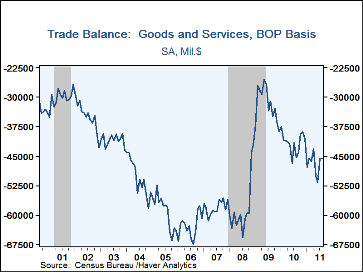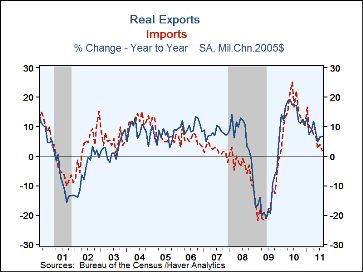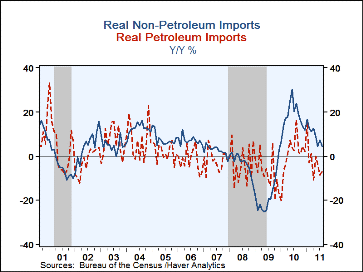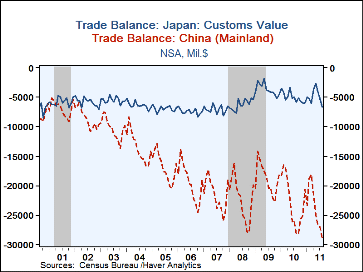 Global| Oct 13 2011
Global| Oct 13 2011U.S. Trade Deficit Is Stable -- With China A Record
by:Tom Moeller
|in:Economy in Brief
Summary
The foreign trade deficit for August held at $45.6B versus a revised $45.6B in July, initially reported as $44.8B. Expectations had been for $46.0B, according to Action Economics. Exports slipped 0.1% (+14.7% y/y) following their 3.4% [...]
The foreign trade deficit for August held at $45.6B versus a revised $45.6B in July, initially reported as $44.8B. Expectations had been for $46.0B, according to Action Economics. Exports slipped 0.1% (+14.7% y/y) following their 3.4% July jump while imports also slipped negligibly (+11.4% y/y) for the second consecutive month. In chained 2005 dollars, the overall deficit in goods deepened to $47.0B; real exports slipped 0.7% (+6.7% y/y) while real imports ticked up 0.2% (1.9% y/y).
Goods exports were unchanged (+16.6% y/y) during August. Exports of nonauto consumer goods recovered 1.7% (6.5% y/y) but capital goods slipped 0.9% (+11.3% y/y). Exports of foods, feeds & beverages rose 2.2% (14.5% y/y) while automotive vehicles fell 8.2% (16.4% y/y).Services exports were unchanged (9.7% y/y). Travel exports fell 2.3% (+11.4% y/y) as fewer individuals visited the U.S. and passenger fares slipped 0.8% (+25.5% y/y).
Overall imports in August slipped as goods imports were unchanged (+13.2% y/y). Imports of industrial supplies rose 1.4% (+26.7% y/y) but imports of autos fell 3.2% (+8.8% y/y). Other consumer goods imports fell 1.8% (+0.7% y/y) while imports of capital goods slipped 0.6% (+11.1% y/y).Imports of services slipped 0.4% (+2.5% y/y). Travel imports fell 1.9% (+4.6% y/y as fewer U.S. citizens traveled abroad while passenger fares fell 2.0% (+12.8% y/y).
The value of August's petroleum imports rose 2.1% and by nearly one-third y/y with higher prices. That followed sharp declines during the prior two months. The cost of crude oil per barrel slipped m/m to $102.62; in August 2010, the average price was $73.47. During August, the volume of energy-related petroleum imports fell 7.0% y/y.
By country, the goods trade deficit with Mainland China deepened to a record $29.0B. Imports from there increased 5.6% y/y while exports rose 16.6% y/y. With Japan, the deficit worsened to $6.7B, its deepest in three years as exports rose 9.9% y/y but imports rose 13.0% y/y. The deficit with the European Union was roughly unchanged at 9.0B with a 15.8% y/y gain in exports to Europe and a 13.9% rise in imports.
The international trade data can be found in Haver's USECON database. Detailed figures are available in the USINT database. The expectations figures are from the Action Economics consensus survey, which is carried in the AS1REPNA
The minutes to the latest FOMC meeting can be found here.
| Foreign Trade | Aug | July | June | Y/Y | 2010 | 2009 | 2008 |
|---|---|---|---|---|---|---|---|
| U.S. Trade Deficit | $45.6 | $45.6B | $51.6B | $45.5B (8/10) |
$500.0B | $381.3B | $698.3B |
| Exports-Goods & Services | $177.6B | $177,6B | $171.8B | $154.9B | $1,838B | $1,575.0B | $1,842.7B |
| % Change | -0.1% | 3.4 | -2.2 | 14.7 | 16.7 | -14.5 | 11.4 |
| Imports-Goods & Services | $2,232B | $222.3B | $223.4B | $196.2B | $2,333.8B | $1,956.3B | $2,541.0B |
| % Change | -0.0 | -0.0 | -1.1 | 11.4 | 19.5 | -23.0 | 8.1 |
| Petroleum | 2.1 | -6.1 | -4.9 | 30.1 | 32.5 | -44.0 | 37.0 |
| Nonpetroleum goods | -0.4 | 1.5 | -0.3 | 9.5 | 20.8 | -20.9 | 1.5 |
Tom Moeller
AuthorMore in Author Profile »Prior to joining Haver Analytics in 2000, Mr. Moeller worked as the Economist at Chancellor Capital Management from 1985 to 1999. There, he developed comprehensive economic forecasts and interpreted economic data for equity and fixed income portfolio managers. Also at Chancellor, Mr. Moeller worked as an equity analyst and was responsible for researching and rating companies in the economically sensitive automobile and housing industries for investment in Chancellor’s equity portfolio. Prior to joining Chancellor, Mr. Moeller was an Economist at Citibank from 1979 to 1984. He also analyzed pricing behavior in the metals industry for the Council on Wage and Price Stability in Washington, D.C. In 1999, Mr. Moeller received the award for most accurate forecast from the Forecasters' Club of New York. From 1990 to 1992 he was President of the New York Association for Business Economists. Mr. Moeller earned an M.B.A. in Finance from Fordham University, where he graduated in 1987. He holds a Bachelor of Arts in Economics from George Washington University.










